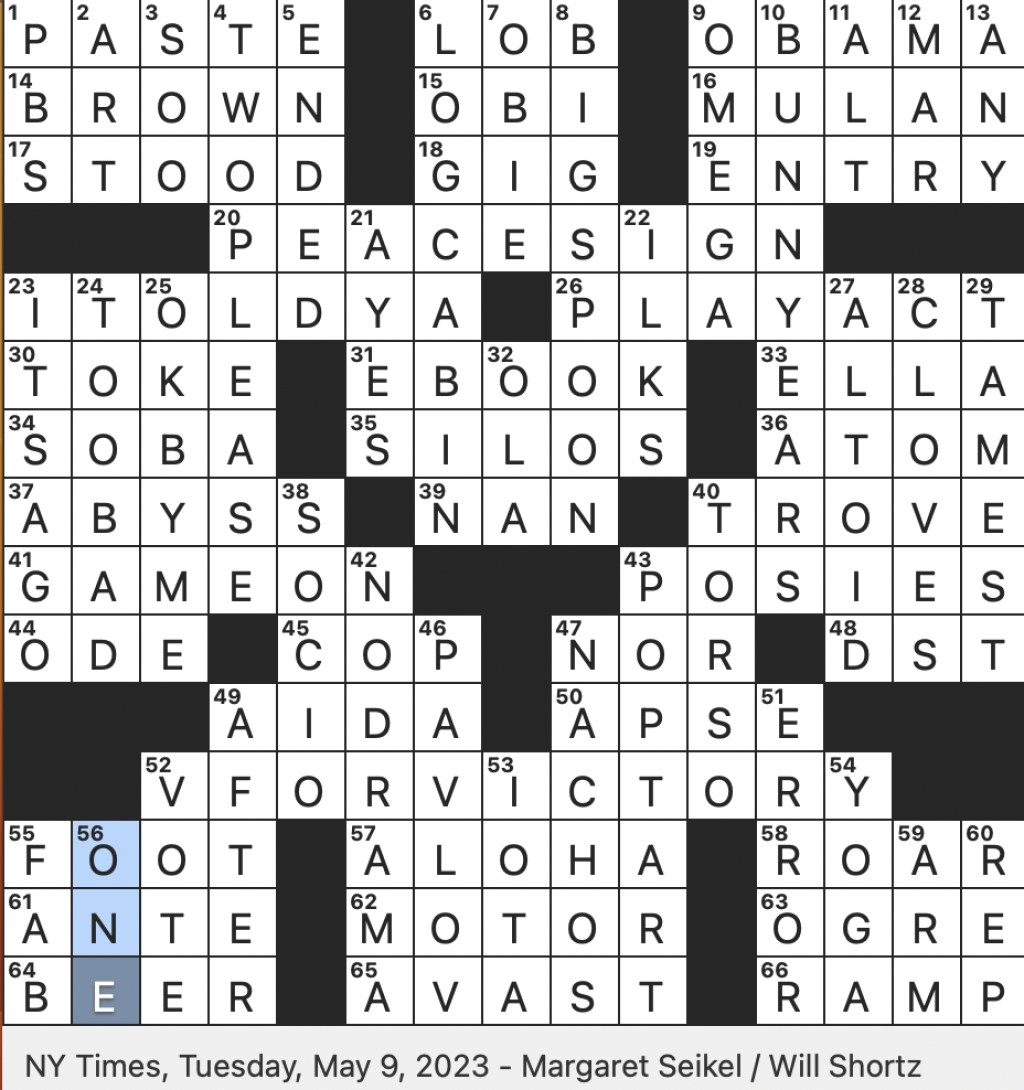Crack The Puzzle: Suffix With Lion NYT Crossword Clue – Find The Solution Now!
Suffix with Lion NYT Crossword Clue: Unveiling the Enigmatic Wordplay
Greetings, Lions Enthusiasts! Today, we delve into the fascinating world of crosswords as we decipher the mysterious clue suffix with lion NYT crossword clue. Crossword puzzles have long been a favorite pastime for many, challenging our minds and providing hours of entertainment. In this article, we will unravel the meaning behind this specific crossword clue and explore its significance. So, let’s embark on this linguistic adventure together!
Introduction
Crossword puzzles have been captivating puzzle enthusiasts for decades, and The New York Times crossword is renowned for its clever clues and challenging solutions. Solving a crossword puzzle requires a combination of wordplay skills, extensive vocabulary, and a keen eye for detail. One such clue that has puzzled many crossword enthusiasts is suffix with lion NYT crossword clue. To understand its significance, we must analyze the clue’s elements and contextualize it within the larger puzzle. Let’s break it down step by step.
2 Picture Gallery: Crack The Puzzle: Suffix With Lion NYT Crossword Clue – Find The Solution Now!


What Does Suffix with Lion NYT Crossword Clue Mean?
The clue suffix with lion NYT crossword clue can be interpreted as a hint to find a word or a combination of letters that follows the term lion in The New York Times crossword puzzle. In crossword puzzles, a suffix is a word element added to the end of a base word to create a new word with a different meaning. The inclusion of NYT indicates that the crossword clue is specific to The New York Times crossword puzzle, known for its linguistic complexity and clever wordplay.
Who Creates Crossword Puzzles?
Crossword puzzles are the creations of skilled crossword constructors. These individuals craft intricate puzzles that challenge solvers’ minds while adhering to a set of rules and standards. The New York Times, for example, has a team of esteemed crossword constructors who meticulously construct and edit their puzzles to ensure quality and enjoyment for their readers.
When Did Crosswords Gain Popularity?

Image Source: gamerjournalist.com
The first published crossword puzzle appeared in 1913 in the New York World newspaper, created by journalist Arthur Wynne. Since then, crosswords have gained immense popularity, captivating people of all ages and backgrounds. The New York Times introduced its crossword puzzle in 1942, becoming an integral part of the newspaper’s daily content and attracting a devoted following.
Where Can You Find the Suffix with Lion NYT Crossword Clue?
The suffix with lion crossword clue can be found in The New York Times crossword puzzle, a daily feature of the newspaper. Additionally, crossword puzzles have transcended print media and can now be found online, allowing puzzle enthusiasts to enjoy them at their convenience. Numerous websites and mobile applications offer digital crossword puzzles, including The New York Times’ official website.
Why Are Crossword Puzzles So Popular?
Crossword puzzles have garnered popularity for several reasons. Firstly, they provide mental stimulation and challenge individuals to think creatively. Solving a crossword requires analytical thinking, vocabulary recall, and pattern recognition, all of which exercise the brain and improve cognitive abilities. Additionally, crosswords offer a sense of accomplishment and satisfaction when a challenging clue is finally deciphered, making them a rewarding pastime.
How to Approach the Suffix with Lion NYT Crossword Clue?
When tackling the suffix with lion crossword clue, it is crucial to adopt a systematic approach. Begin by examining the surrounding clues and filling in any words that are already known. Look for word patterns, synonyms, antonyms, and common crossword tricks such as anagrams or hidden words. Crossword dictionaries and online resources can be valuable aids in deciphering challenging clues. Persistence and patience are key to successfully solving the puzzle and unraveling the meaning behind the suffix with lion NYT crossword clue.
Advantages and Disadvantages of Crossword Puzzles

Image Source: googleusercontent.com
Like any activity, crossword puzzles have both advantages and disadvantages. Let’s explore them in detail:
Advantages:
1. 🌟 Mental Stimulation: Solving crossword puzzles challenges your brain and improves cognitive abilities.
2. 🌟 Vocabulary Expansion: Crosswords expose you to new words, expanding your vocabulary.
3. 🌟 Relaxation and Entertainment: Crosswords provide a relaxing and enjoyable way to pass the time.
4. 🌟 Memory Enhancement: The mental exercise involved in crossword solving can enhance memory retention.
5. 🌟 Problem-Solving Skills: Crosswords hone your problem-solving skills and boost critical thinking abilities.
Disadvantages:
1. ❌ Time-Consuming: Crosswords can be time-consuming, especially for challenging puzzles.
2. ❌ Frustration: Difficult clues or unsolved sections of the puzzle can lead to frustration.
3. ❌ Dependency on Vocabulary: A limited vocabulary may make certain puzzles more challenging.
4. ❌ Addiction: Some individuals may develop an addictive tendency towards crossword puzzles.
5. ❌ Limited Social Interaction: Crossword puzzles are generally a solitary activity, limiting social interaction opportunities.
Frequently Asked Questions (FAQ)
Q1: Are crossword puzzles only for language enthusiasts?
A1: No, crossword puzzles can be enjoyed by anyone. While having a good command of language is helpful, crossword puzzles provide an opportunity to learn and expand vocabulary.
Q2: Can I solve a crossword puzzle without any prior experience?
A2: Absolutely! Crossword puzzles come in varying difficulty levels, including beginner-friendly puzzles. Start with easier puzzles and gradually challenge yourself as you gain experience.
Q3: Can I solve crossword puzzles online?
A3: Yes, you can solve crossword puzzles online through various websites and mobile applications. The New York Times offers a digital version of its crossword puzzle on their official website.
Q4: How can I improve my crossword-solving skills?
A4: Consistent practice is key to improving your crossword-solving skills. Engage in puzzles regularly, familiarize yourself with common crossword tricks, and expand your vocabulary.
Q5: Are there any strategies to solve crossword puzzles more efficiently?
A5: Yes, there are various strategies you can employ. Start by filling in the easier clues and use cross-referencing to solve interconnected clues. Additionally, look for word patterns and pay attention to the tense and context of the clues.
Conclusion: Explore the World of Crossword Puzzles!
Brave readers, we hope this exploration of the suffix with lion NYT crossword clue has provided you with valuable insights into the world of crossword puzzles. Whether you are a seasoned solver or a novice enthusiast, crossword puzzles offer a plethora of benefits, from mental stimulation to vocabulary expansion. So, grab a pen or visit an online crossword platform and embark on your own crossword journey. Challenge yourself, have fun, and enjoy the satisfaction of cracking those enigmatic clues!
Final Remarks: A Word of Caution
It is important to approach crossword puzzles with moderation. While they can be a delightful and intellectually stimulating pastime, excessive dependence on crossword puzzles may lead to neglect of other important activities. Maintain a healthy balance in your leisure pursuits and remember to engage in a variety of mental exercises to keep your brain sharp. Happy crossword solving!
This post topic: Lions



